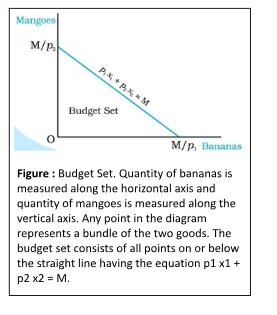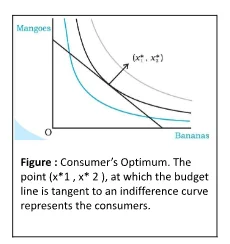![]() 29 Nov 2023
29 Nov 2023
Consider a consumer who can buy only two items with a set quantity of money (income). The market sets the prices for the goods. When a consumer is unable to purchase any and every possible combination of the two things she might desire to use, it is called consumer’s budget constraint.
The consumer’s possible consumption bundles are determined by the cost of the commodities and their income. The consumer can only afford to purchase bundles that cost her less than or equal to her fixed income given the costs of the two commodities and her limited income.
Budget Set: It is the collection of all bundles available to the consumer at market prices.

x2 = (M/P2)-(P1/P2)x1
Price Ratio and the Slope of the Budget Line: Striking a Balance

<div class="new-fform">
</div>